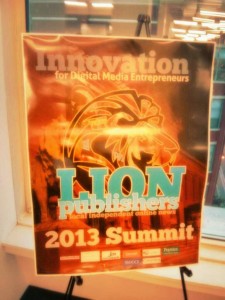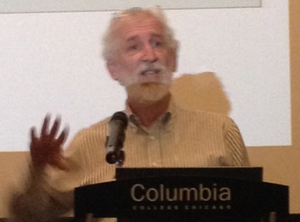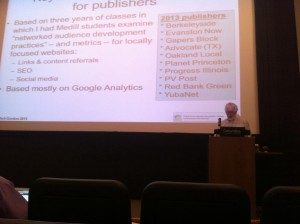
Charlotte Ann Lucas and Ned Berke were just two of the speakers for the LION conference’s lightning rounds, trying to get out as much information as possible in a 10-minute presentation.
Lucas is the director of NOWCastSA, a news publication in San Antonio, Texas. Her presentation focused on her experiences running webcasts on her site. She said webcasts are sometimes paid for by whoever wants an event covered, including high schools who are looking to live stream their graduation ceremonies.
Lucas said she is trying to get her publication’s webcasts on to mobile devices because she said families in lower income households are more likely to go online through their phones. Webcasts are also archived on the site, so they can be viewed at a later time.
“Sometimes the local news channels look at us as the local C-SPAN,” Lucas said, adding that over 200 hours of local programming have been covered by her company.
Audience members asked about the most efficient – and the cheapest – ways to live stream events and make them look as professional as possible.
“The easiest way to make it look professional is putting your device on a tripod,” Lucas said. She also suggested that people “test audio the day before – if the audio sucks, the video sucks.”
One item worth investing in is quality online connection, Lucas said. Wi-Fi often fails, she said, and being able to have quality live streaming video that stays connected while filming isn’t very expensive. Coupled with a Mac computer, as opposed to multiple cameras, her company spent $3,000 for a year’s worth of quality live stream videos.
Also speaking during the lightning rounds was Ned Berke, the editor and publisher of Sheepshead Bites. It is the only indie news publication for Sheepshead Bay in Brooklyn, New York.
His presentation focused on his coverage during Hurricane Sandy and the challenges people face while reporting during difficult times.
Berke describes his site as hyper-local and said he looks at community publications in a very personal style.
During the clean-up after Sandy hit, Berke said major media outlets never got down to Sheepshead Bay. He created a page on his site to work as a communication exchange, where people could get information about people in the area.
Berke said it was the community outlets that made a difference in recovery at the local level. Coincidentally, one audience member happened to also be from Sheephead Bay. He said he would have had no way of knowing what was going on in the community, if it had not been for Berke’s coverage on his site.
As for the business side of his site, Berke said, “Nothing essential was lost during the storm because our business is digital.”
When asked what he would suggest for anyone caught in a similar situation, Berke said to “always have a backup who can update the publication.”
Berke, as well as many other residents, were getting all of their news on their phones after the storm.
Berke ended his presentation by highlighting, just as Lucas had, the ever increasing importance of creating a mobile version of online news publications.






Be First to Comment